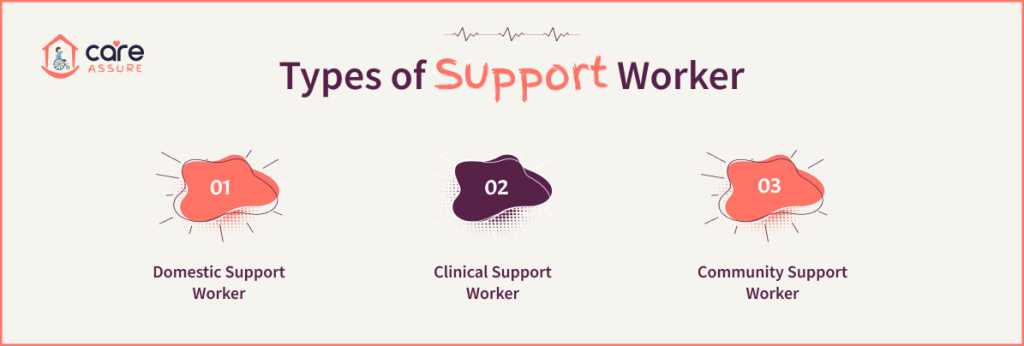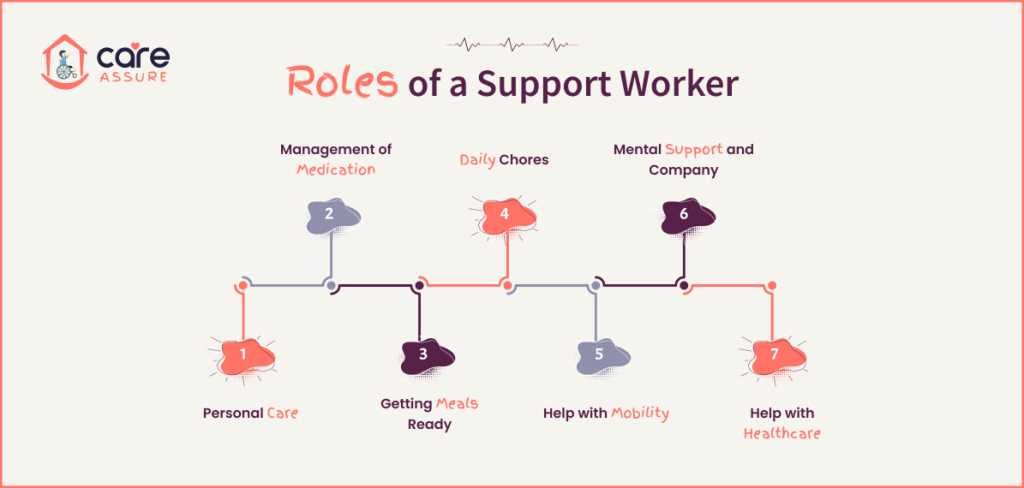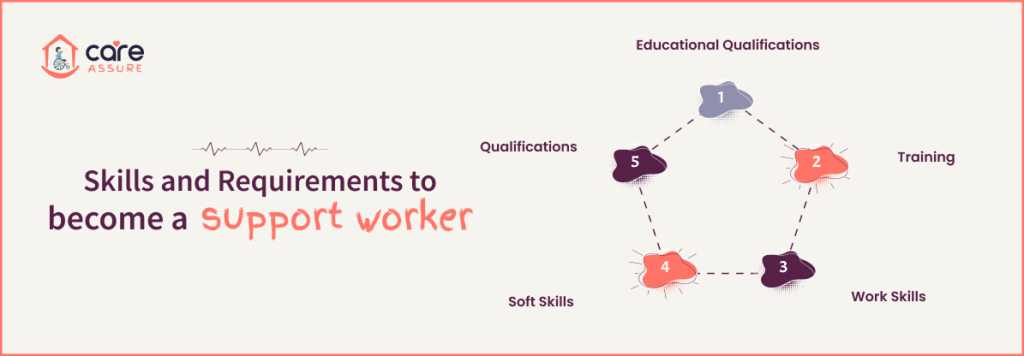What Support Workers Do?
July 2, 2024
|By Careassure
|13 min read

Becoming a support worker can be fulfilling if you appreciate serving people and attending to their needs. By carrying out supportive duties, this job route assists you in developing critical interpersonal skills and emotional awareness, regardless of whether you are aiding adults or youngsters. Knowing their duties will enable you to assess whether this is your suitable career route. This article addresses the topic, "What does a support worker do?" and looks at the typical work atmosphere, average pay, and requirements for support workers.
There are many opportunities to receive on-the-job training and learn new skills; prior experience or certifications are not always requirements. Discover if a career as a support worker is right for you and get professional guidance on potential pay, types of support worker positions, and career advancement.
What is a Support Worker?
A support worker is a person who helps those who are vulnerable to maximise their everyday experiences. Providing emotional and practical assistance, they help service users with a range of physical and mental disability needs to live more independently and achieve their goals. A support worker's job description is incredibly diverse. Since every service user is unique, the support they receive is customised for them. Because of this, it's a fulfilling job where you can help vulnerable individuals live better lives and truly make a difference in their lives
Types of Support Worker
There are three different kinds of support personnel to consider, including:

Domestic support worker
A domestic support worker assists their patient in a domestic setting, such as a home or private property. These specialists can work with everyone, including young people, the elderly, and those with impairments. The support worker is required when these patients cannot complete a major portion of their daily responsibilities at home alone or require assistance completing specialised duties. Their responsibilities are vast, from laundry to cooking meals and listening to their problems. Other roles to consider in the domestic setting include care workers' personal assistants, caregivers, and domiciliary carers.Clinical support worker
A clinical support worker helps their patients in a medical or clinical context, such as a hospital or private practice. They support their patients with a variety of tasks within a medical facility. This type of care worker may assist patients in using the restroom or changing into hospital gowns. Depending on the severity of their patient's needs, they may also assist them with other activities, such as taking medication.- In a clinical context, there are a few roles to consider for your personal and professional goals:
![icon]()
- Ward clerks and nursing assistants
![icon]()
- Nursing Assistants
![icon]()
- Language and speech therapy assistants
![icon]()
- Occupational therapy assistants
![icon]()
- Physiotherapy assistants
![icon]()
Community support worker
A communal support worker is a professional who helps patients, including adults and children, in difficult living situations or with impairments. The most prevalent kind of communal support worker is a social care worker.When supporting adults, they may be assisting them with a mental health crisis or a physical impairment. When helping children, they may provide preventative support or protection, including adoption and fostering services if appropriate. Their primary goal in working with people is to help them attain health and well-being while promoting a higher quality of life.
Roles of a Support Worker
Support workers are an important part of the social services and healthcare industries because they help people who need help with their daily lives and health. Their work often takes them to different places, like hospitals, schools, community centres, and private houses. Take a close look at what a support worker does and how they do it:
Personal care
Support workers are very important when helping clients with personal cleanliness tasks. This includes helping them bathe, dress, clean, and go to the bathroom. These jobs are necessary to protect the client's health, comfort, and sense of dignity, especially for people with trouble moving around or serious health problems. Workers make sure that clients feel clean and cared for by giving them this help, which can greatly improve their self-esteem and general health. Personal care also helps keep you from getting infections and skin problems, which is good for your health.Management of medication
One of the main jobs of support workers is to make sure that their clients take their medications as prescribed. This means telling people to take their medicines, helping them give themselves pills, injections, or topical treatments, and ensuring they take the right amounts at the right times. Taking care of medications correctly is important for treating health problems and avoiding problems from missing or mixing doses. Support workers also closely monitor their clients to see if they have any bad reactions or side effects. They keep detailed records of problems and immediately tell healthcare experts about them to begin the right treatment.Getting meals ready
Support workers often plan, shop for, and cook meals for their clients so that they can meet their dietary needs and tastes. In this job, you'll ensure that meals are healthy and fit any medical or food needs. Support workers help clients stay healthy and deal with long-term problems like diabetes or heart disease by ensuring they eat well-balanced meals. Food safety and cleanliness are also considered to ensure that clients get healthy and safe meals.Daily chores
Another important part of a support worker's job is keeping the living space clean and organised. They help with things around the house, like cleaning, laundry, and general tidying up. A clean home lowers the risk of getting sick and having an accident, making it a safe and pleasant place for clients to live. Support workers also help set up the home to be safe and easy to get to, which is especially important for clients with trouble moving around. This support makes clients feel more at ease in their surroundings and can improve their lives.Help with mobility
Support workers help people with trouble safely get around their homes and communities. Helping clients move from bed to wheelchair, walking with them, and driving them to meetings and social events are all part of this. With the right movement help, the client can stay independent and mobile for as long as possible without falling or getting hurt. Support workers help clients stay busy and involved, which is good for their physical and mental health, by ensuring they can safely move around.Mental support and company
A support worker's most important job is to offer mental support and company. They have talks with clients, listen to their worries, and reassure them emotionally. This job is very important for clients who may feel alone or separated since regular contact can make a big difference in their mental and emotional health. Support workers also push their clients to keep in touch with family and friends and participate in social activities. This helps them feel like they are part of a community. Building trust between the client and the support worker is important for good care, and this social support helps.Help with healthcare
Support workers often help their clients with their basic medical needs, giving them the care they need to take care of their health at home. This can include changing bandages, monitoring vital signs like temperature and blood pressure, and helping with physical therapy activities. By giving this kind of help, workers help keep people out of the hospital again and speed up their healing and rehabilitation. They also keep detailed records of the client's health and inform healthcare workers about any changes or concerns. This makes sure that the client gets continuous and well-coordinated care. This job is very important for keeping the client healthy and avoiding problems.Help with healthcare
You might be able to get a job as a support worker if you have these skills:

Educational qualifications
Qualifications may not be required, but they can help you get jobs and show possible employers that you are serious about your support work knowledge and skills. If you want to work in this area, you might want to study social work or psychology. These two fields of study teach you the basics of support work so that you can use them in different areas.Training
Getting hands-on experience through job shadowing or internships can be very helpful as you work up to becoming a support worker. With this training, you can watch, help, and learn from a trained support worker. You might also learn some skills by taking on small tasks first and then moving on to bigger chores. You might also be able to train to be a support worker by taking more vocational classes.Work skills
Support workers learn skills like these:Health care practices: You might need these skills to help hospital staff. It's important to know basic healthcare tasks like caring for patients' needs and helping them leave the hospital.
Making a schedule: Using a schedule to help your clients get into a habit can help them become more independent. Making schedules can also help you keep track of your time when you have a lot of people to help.
Writing reports: Support workers may write reports about each session to monitor a client's growth and interactions.
Budgeting means helping people keep track of their money and spend and save it wisely. For instance, you could help your clients make a good budget for their grocery shopping.Computer skills: You must use a computer to track your contacts and talk to others daily. For instance, you could use computers to gather, store, and organise information about your patients and plan their visits and sessions.
Soft skills
These traits are useful for this job:Being patient is important because you may be working with clients for a long time, such as helping them get care or get better.
A good support worker listens actively to understand what a client is saying, acknowledge their feelings, and figure out what they need. When you ask questions while the client talks, you are actively listening.
Working with others: A support worker might be part of a healthcare team, and they need to work well with others to ensure they meet the client's needs. If you can talk to your coworkers clearly, you may be able to work together better.
Paying attention to details can help a support worker determine what patients need and how they are doing by recognizing different situations. This skill could be useful when working with people who have trouble talking.
Qualifications
Before hiring you as a support worker, employers may look at your skills and training. If you want to work as a social worker, you need a Level III qualification in social work, child care, education, counselling, social work, or youth work. For instance, if you have a licence in healthcare support, you might be able to work as a support worker in the healthcare field. Before they hire you, employers may also ask for a history check.Conclusion
It can be said that community support workers are the backbone of care because they do so many important things to help people in need, improve their health, and help them become more independent. The main jobs of support staff are providing physical care, mental support, and financial help to needy people. These tasks help people with their daily lives and make society more accepting and helpful. Society support workers help their clients feel respected, trustworthy, and strong, which is good for them and society. These people are great examples of empathy and have a huge, long-lasting effect on everyone they meet.
Frequently Asked Questions (FAQs)
A support worker is a professional who assists individuals who need help with daily activities and overall well-being due to age, illness, disability, or other factors. Their role encompasses a variety of tasks aimed at improving the quality of life for their clients.





